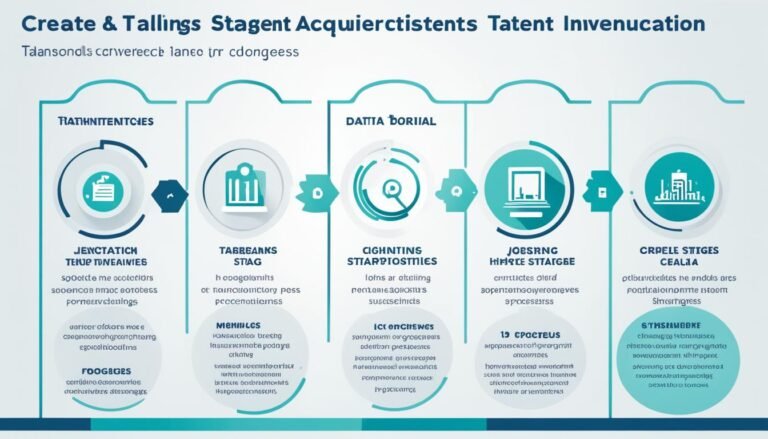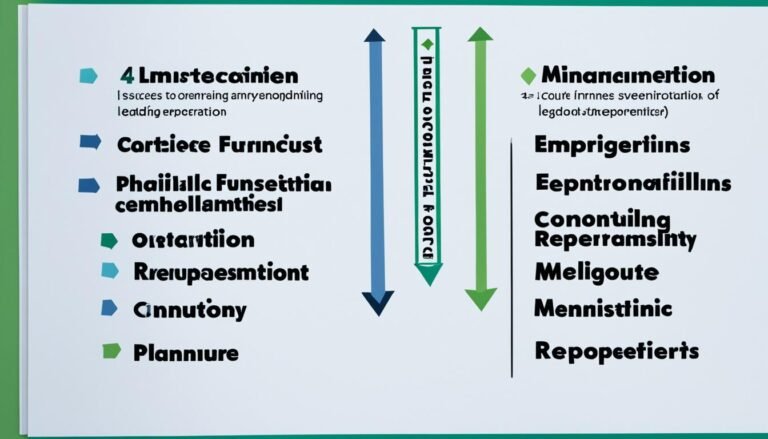How does emotional intelligence benefit managers?
Managers with high emotional intelligence are almost 20% more likely to be successful in their roles. They understand and manage their own feelings. They also spot emotions in others and know how to sway those emotions.
This ability is crucial for leading and managing well. It helps create a happy workplace, boost productivity, and form solid bonds. It also aids in making sound choices.
Now, let’s dig into why emotional intelligence is key for managers and how it boosts their performance.
Key Takeaways:
- Managers with high emotional intelligence are nearly 20% more likely to be successful in their roles.
- Emotional intelligence allows managers to understand and manage their own emotions, as well as recognize and influence the emotions of others.
- Developing emotional intelligence enables managers to create a positive work culture, increase efficiency, build strong relationships, make better decisions, and motivate their teams.
- Emotional intelligence plays a significant role in career growth and advancement for managers.
- Cultivating emotional intelligence is essential for managers to succeed as effective leaders.
What is Emotional Intelligence?
Emotional intelligence means managing your own feelings and understanding others. It is key in leadership and management. Emotional intelligence includes knowing yourself well and controlling your emotions.
It involves understanding your emotions, strengths, weaknesses, and values. This self-awareness helps you make better choices and adjust your actions. So, it’s about feeling your own feelings and handling them well.
Self-management is about controlling your emotions in different situations. It includes managing stress, being disciplined, and staying strong. This helps you stay calm and positive in tough times.
Social awareness means you get others’ emotions and points of view. You notice both what people say and how they act. Being empathetic lets you connect deeply with others, building strong relationships.
Building and keeping good relationships is relationship management. It needs good communication, settling issues, working together, and collaboration. This part is essential for a peaceful workplace and meeting team goals.
Managers with emotional intelligence handle tough situations with care and insight. They form close bonds with their teams, which builds trust and open talks. They can also make the workplace a happy place, where everyone feels valued, motivated, and helped.
The Importance of Emotional Intelligence in Leadership
Emotional intelligence is key for leaders, especially those in charge. It helps leaders connect with team members on an emotional level. Developing emotional intelligence aids in building trust. It also encourages collaboration and helps create a united work environment.
Being emotionally intelligent means understanding your own feelings. This helps leaders face challenges calmly and with care. They keep a level-headed view when problems arise. This leads to better solutions and good outcomes.
Additonally, emotional intelligence leads to better choices. Leaders who think about how others feel can make decisions that benefit everyone. This mix of logic and empathy improves their decision-making. It leads to more success.
Emotional intelligence boosts employee motivation. Leaders who show empathy make work a better place. This support and understanding help workers feel valued. It drives them to do their best, making productivity and job happiness go up.
“Emotional intelligence is crucial for leaders, not optional. It greatly affects team dynamics and success.”
Building strong relationships is another big part of emotional intelligence in leadership. Leaders with this skill can relate to their team members. They understand their needs and offer real help. This makes the team work together better and communicate openly.
At its core, emotional intelligence helps leaders create positive work atmospheres. It drives team motivation and aids in good decision making. Building strong relationships is easier with this skill. It truly sets great leaders apart.
The Relationship between Emotional Intelligence and Leadership Success
Studies link emotional intelligence to leadership success. Leaders with high emotional intelligence excel at leading. They foster innovation and meet goals better than others.
Google’s research found that emotionally intelligent leaders have teams that collaborate more effectively. They perform better and achieve higher success levels. This is often greater than the success of teams led by those with less emotional intelligence.
This table shows how emotional intelligence affects leadership success:
| Leadership Success Factors | Leaders with High Emotional Intelligence | Leaders with Low Emotional Intelligence |
|---|---|---|
| Employee engagement and satisfaction | High | Low |
| Team collaboration and innovation | High | Low |
| Effective decision-making | High | Low |
| Conflict resolution | Effective | Ineffective |
| Employee retention | High | Low |
The table clearly shows that high emotional intelligence impacts vital areas positively. These include how engaged the employees are, teamwork, decision making, resolving conflicts, and keeping staff. These aspects improve a company’s overall success.
Enhancing emotional intelligence is key for leaders who want to succeed in the long run. Through self-reflection and seeking feedback, they can improve. Continuous learning also helps them become more effective in leading others.
The image above visually represents the importance of emotional intelligence in leadership. It highlights its role in connecting with team members, making better decisions, and building strong relationships.
The Components of Emotional Intelligence in Leadership
Emotional intelligence is key in being a good leader. Leaders with this skill can understand themselves and others better. They can control their emotions and influence how others feel. For managers to be successful, they should work on a few key parts of emotional intelligence. These are:
- Self-awareness: Knowing and understanding your emotions, strengths, and weaknesses.
- Self-management: Handling your own emotions and actions well, even when it’s tough.
- Social awareness: Caring about others’ feelings and being aware of social cues.
- Relationship management: Developing and keeping good relationships, solving problems, and encouraging others.
Managers must develop these emotional intelligence aspects to lead effectively. Understanding yourself helps you see where you can improve. Controlling your behavior means you can lead by staying calm. Being socially aware helps you meet your team’s needs and knows what motivates them. Managing relationships well builds trust, improves communication, and makes a positive workplace.
Check out this table for more on emotional intelligence in leadership:
| Components of Emotional Intelligence |
|---|
| 1. Self-awareness |
| 2. Self-management |
| 3. Social awareness |
| 4. Relationship management |
Emotional Intelligence and Positive Work Culture
Emotional intelligence is key for managers creating a great work vibe. When managers are emotionally smart, they make everyone feel supported and included. This boosts the team’s happiness and success. Managers who can handle their feelings and help others do the same, can lead to a work setting where people work together well, are happy, and do good work.

“An emotionally intelligent leader knows their actions shape the work culture. They aim to build a place that’s big on caring, clear talk, and taking note of everyone’s differences. This makes a space where team members feel safe sharing ideas, trying new things, and bringing their unique view.”
By making a positive culture, emotional intelligence also improves how well leaders lead. Leaders with emotional smarts are more likely to lead others to meet goals together. Their way of leading with care and understanding makes room for new ideas and actions. This makes team members really want to do their best, helping the team and company do really well.
The Benefits of Emotional Intelligence in Work Culture
1. Increased Efficiency: A good work culture from emotional intelligence makes team members more active and excited about their work. This jump in focus turns into better work being done faster and more efficiently.
2. Enhanced Collaboration: Emotional intelligence helps make bonds and boosts how well people work together. By seeing and valuing what each person offers, smart managers make a place where new ideas and great team efforts happen.
3. Improved Job Satisfaction: Feeling respected and supported at work makes people love their jobs more. Emotional intelligence helps managers really care for their teams. This lifts up how happy people are with their work, making them want to stay and do their very best.
4. Reduced Conflict: Managers with emotional intelligence can spot and solve problems before they become big, creating more understanding and shared solutions. This stops fights from wrecking the good feeling at work.
5. Stronger Employee Loyalty: A warm work culture built on EI makes people more loyal to their work. Feeling respected and part of a valued team makes staff stick around longer. This keeps the best people at the company.
Emotional intelligence really makes work a place where everyone thrives. It’s key for great leading and happy staff. Focusing on EI helps managers make a space where success, joy, and working well with others is the norm. This boosts not just personal success but the team and company too.
Emotional Intelligence and Decision Making
Emotional intelligence is key for managers to make the right decisions. They need to be aware of their own feelings. This helps them make choices clearly and without personal bias. So, they can decide what’s best based on facts and logic.
Managers with high emotional intelligence also understand how others feel. This makes the workplace more team-focused and caring. They make decisions that benefit both the team and the company. Thinking about their team’s emotions also boosts happiness and job satisfaction.
Dealing with intense emotions at work is challenging but essential. It’s important for managers to stay cool in tough situations. Emotional intelligence gives them the tools to do this. Their calm handling of crises leads to smarter choices that balance feelings and logic.
Additionally, emotional intelligence helps managers spot their own biases. They learn how to break free from prejudiced thinking. This ensures decisions are fair for everyone involved.
“Emotional intelligence allows managers to approach decision-making with clarity, empathy, and objectivity, resulting in outcomes that benefit both individuals and the organization as a whole.”
Emotions deeply shape our decision-making. How we feel affects how we see things and what we choose. So, emotional intelligence is a must for managers. It helps them lead their team towards the best choices, based not just on logic but also on understanding and empathy.
When managers use emotional intelligence in decision-making, it changes the workplace for the better. The team becomes more united and upbeat. Such a positive work culture drives success and growth.
Key Benefits of Emotional Intelligence in Decision Making:
- Objective and rational decision-making
- Consideration of emotions and perspectives of others
- Enhanced employee satisfaction and engagement
- Effective handling of challenging situations
- Recognition and mitigation of biases
- Promotion of fairness and inclusivity
Emotional intelligence empowers managers to make balanced and ethical decisions. By mastering emotional intelligence, managers lead in a way that builds trust, encourages teamwork, and achieves success.
| Emotional Intelligence and Decision Making | Managing Emotions in the Workplace |
|---|---|
| Objective and rational decision-making | Creating a positive work culture |
| Consideration of emotions and perspectives | Enhancing employee satisfaction and engagement |
| Effective handling of challenging situations | Recognizing and managing biases |
| Promotion of fairness and inclusivity | Driving organizational success |
Emotional Intelligence and Employee Motivation
Managers who are emotionally intelligent can really motivate their team. They understand their team’s feelings. This understanding makes the workplace positive and supportive. It boosts how motivated, engaged, and committed employees are to the company’s goals.
When managers are emotionally intelligent, they see what their team needs. They connect with their team on an emotional level. This helps them inspire their team in personalized ways. They give support when times get hard, praise successes, and make their team members feel like they belong and have a purpose.
Active listening is a big part of emotional intelligence. Managers who really listen to their team show that they care. This makes employees feel important and understood. And it increases how motivated they are.
Emotionally intelligent managers are good at feedback. They know how to praise good work and suggest ways to improve. They do this in a way that’s kind and understanding. It helps team members get better and be more dedicated to their job.
Understanding and managing the emotional side of work is important. Good managers know when their team needs help, whether it’s stress from work or personal issues. They offer help and support with care. This builds trust and loyalty.
Emotional intelligence makes the work environment better for everyone. When employees feel cared for and supported, they work harder. They are more involved and committed to their work. This helps the team and the company do well.
Real-world examples of using emotional intelligence to motivate employees:
| Example | Emotional Intelligence Skill |
|---|---|
| A manager notices that a team member seems demotivated and withdrawn. | Empathy |
| The manager takes time to listen attentively to the team member and discovers that they are dealing with personal issues. | Active Listening |
| The manager expresses empathy and offers support, suggesting resources that can help alleviate the team member’s personal challenges. | Supportive Guidance |
| Over time, the team member feels understood and supported, leading to renewed motivation and engagement. | Creating a Supportive Work Environment |
Emotional Intelligence and Strong Relationships
Strong relationships are key in the workplace, especially for leaders. Emotional intelligence helps leaders connect with their team. It makes for a trusting atmosphere where everyone feels heard and understood. This leads to better work, more creativity, and happier workers.
When leaders are emotionally intelligent, they can understand their team members better. They know how to show support and empathy. This makes the team feel valued, helping them work better together.
Good relationships at work mean people feel free to share their ideas. They lead to a place where everyone can be open. This openness boosts creativity, problem-solving, and team spirit.
Emotional intelligence also helps in tough times, like when there’s a conflict. Leaders who get the feelings behind a fight can help solve it peaceably. They look at things from all sides and find solutions that work for everyone.
Overall, emotional intelligence is great for a workplace. It makes good relationships possible. These relationships make work better for everyone. People are happier and more driven to reach their goals when they get along with their boss.
Benefits of Emotional Intelligence in Relationship-Building:
- Enhanced understanding and empathy towards team members
- Improved communication and collaboration
- Increased trust and respect
- Effective conflict resolution
- Strengthened teamwork and creativity
- Higher levels of job satisfaction and engagement
For leaders, emotional intelligence is a powerful skill. It helps them make a workplace where people thrive. By working on this skill, leaders can boost both personal and team success.
Developing Emotional Intelligence for Managers
Emotional intelligence helps managers work better with themselves and others. It’s vital for understanding, handling, and affecting emotions. But, like any skill, it can be learned and improved. This happens through looking at oneself, learning better ways, and practicing those methods regularly.
Activities for Developing Emotional Intelligence
There are several things managers can do to boost their emotional intelligence:
- Mindfulness exercises: These exercises make managers more in tune with their feelings and thoughts. It helps them respond better to tough situations without losing control.
- Emotional self-awareness assessments: These include tests or exercises that show managers how they’re doing emotionally. It’s a good way to see what’s working and where they can get better. They offer great advice on how to grow.
- Seeking feedback: Getting feedback from others can open a manager’s eyes to how they affect those around them. It’s a way for them to reflect and find areas they need to improve on.
“Developing emotional intelligence requires ongoing effort and dedication. It means always looking at yourself and practicing to get better. By working on these skills, managers will truly make a difference in their teams and companies.”
These activities lead to a better understanding of emotions. They help managers learn to respond with empathy and effectively in their jobs.
Benefits of Developing Emotional Intelligence
For managers, becoming more emotionally aware offers many perks:
- They know themselves and how to manage their feelings better.
- They’re better at dealing with conflicts and hard talks.
- They show more empathy and get along better with their teams.
- Their relationships and teamwork skills get stronger.
- They’re better at making decisions for their teams and companies.
Working on emotional intelligence can make the workplace better. It can boost morale and build a culture of trust and talking openly.
| Benefits of Developing Emotional Intelligence | Impact on Managers |
|---|---|
| Improved self-awareness and self-management | Managers become more thoughtful and better at handling their emotions and actions. This leads to better leadership. |
| Enhanced ability to manage conflicts and difficult conversations | Managers can work through conflicts and tough talks with understanding, making things better for everyone and their teams. |
| Increased empathy and understanding towards team members | Managers can better grasp and relate to the feelings and needs of their teams. This builds strong relationships and motivates their teams. |
| Strengthened relationships and collaboration | With stronger emotional intelligence, managers create trust and connection with their teams. This leads to better team efforts and working together. |
| Enhanced decision-making capabilities | Managers choose better when they consider reason and feelings. This leads to better outcomes for their teams and companies. |
Developing emotional intelligence is key for managers. It gives them the tools to make workplaces where everyone feels supported, valued, and inspired.
The Benefits of Emotional Intelligence in Management
Managers with high emotional intelligence gain a lot. This helps them succeed and makes the workplace better for everyone. They can handle tough issues well and make smart choices. They also create a positive vibe at work, inspire their teams, build close bonds, and solve problems smoothly.
Improved Handling of Challenging Situations
Emotional intelligence lets managers stay calm in tough times. They manage their feelings well, bring empathy to hard talks, and create spaces for open chat and teamwork.
Informed and Sound Decision Making
These managers are great at making good choices because they look at the facts and feelings. They pick options that are good for the team and the company.
Cultivation of a Positive Work Culture
Being emotionally smart is key to a happy workplace. These managers make people feel important and motivated. They see and honor their team’s feelings, which boosts happiness and work quality.
Enhanced Team Motivation
They understand and support their team’s feelings to keep them inspired. A positive space means a happy and focused team, ready to hit their goals together.
Building Strong and Meaningful Relationships
Emotional intelligence helps them create strong team bonds. They get their team, which builds trust and teamwork. This leads to better work and happier employees.
Effective Conflict Resolution
Dealing with conflict is a breeze for these managers because they get everyone’s feelings. They talk things out, finding solutions that work for all. This keeps things smooth and brings the team closer together.
Visualizing Emotional Intelligence Benefits
| Benefits | Impact |
|---|---|
| Improved handling of challenging situations | Enhanced communication, cooperation, and conflict resolution |
| Informed and sound decision making | Alignment with team and organizational needs |
| Cultivation of a positive work culture | Increased morale, job satisfaction, and employee engagement |
| Enhanced team motivation | Boosted collaboration, productivity, and commitment |
| Building strong and meaningful relationships | Effective teamwork, communication, and job satisfaction |
| Effective conflict resolution | Harmonious work environment and strengthened relationships |
The Role of Emotional Intelligence in Career Growth
Emotional intelligence is key for manager success. It’s more than just technical skills. It helps them lead, solve problems, and influence at work. Those with high EI are seen as top leaders.
Managers can climb the career ladder by working on their EI. They build emotional connections. This leads to trust and respect from team members and bosses. Their emotional skills help them stay calm in tough times and make smart choices for everyone’s benefit.
Continuous growth in EI is crucial for managers aiming for career longevity. It’s about knowing yourself, managing your emotions, understanding others, and handling relationships well. By reflecting and doing mindfulness exercises, they can understand their feelings better. This helps in controlling reactions at work.
To wrap it up, emotional intelligence is essential for manager success. By focusing on their EI, managers can become better leaders. They’ll have more opportunities for growth. And, they can lay the groundwork for lasting career achievements.
Conclusion
Emotional intelligence is key for managers. It deeply affects how they lead and manage. By mastering their own feelings and understanding others’, they shape a positive work space. This boosts productivity and gets everyone more involved.
Good emotional skills help managers bond with their teams. This leads to better teamwork and happiness at work. It also helps them make solid choices, balancing logic with emotions. This brings better results for their groups and companies.
In short, being emotionally smart is vital for a manager’s success. It lets them build a supportive workspace, inspire their teams, and set strong ties. This is crucial not just for them, but for their organization’s growth.
FAQ
How does emotional intelligence benefit managers?
Emotional intelligence allows managers to understand and manage their own feelings. They also learn to recognize and influence others’ emotions. This skill helps create a positive atmosphere at work. It boosts the team’s efficiency and creativity. It also improves decision-making and strengthens team bonds.
What is Emotional Intelligence?
Emotional intelligence deals with how we handle our feelings. It’s about understanding and affecting how others feel too. It helps in many ways such as dealing with tough times, forming close bonds, and making work more pleasant.
What is the importance of emotional intelligence in leadership?
For leaders, emotional intelligence is key for many reasons. It lets them connect with their team on a human level. This creates trust and teamwork. Leaders with this skill make better choices, handle conflict, and inspire their team to win.
What are the components of emotional intelligence in leadership?
In leadership, emotional intelligence involves seeing your own strengths and weaknesses and controlling your emotions. You also need to sense how others feel and build good relationships. These skills are vital for any leader’s success.
How does emotional intelligence contribute to a positive work culture?
When managers are emotionally intelligent, they create a place where everyone feels welcome and important. This boosts everyone’s performance and happiness at work. Emotional intelligence also makes leaders more influential and better at motivating their teams.
How does emotional intelligence affect decision making in managers?
For managers, emotional intelligence helps a lot in making the right decisions. They can keep their own emotions in check. This makes their decisions fair and clear. They also understand how others feel, leading to choices that help both individuals and the team.
How does emotional intelligence contribute to employee motivation?
Managers with high emotional intelligence know how to uplift their team. They understand what their team is feeling and respond effectively. This makes for a positive workplace where everyone is motivated to achieve their best.
How does emotional intelligence help in building strong relationships?
Building good relationships at work starts with emotional intelligence for managers. They learn to understand their team’s feelings, which brings trust and clear communication. This leads to a better working environment and happier and more productive teams.
How can managers develop their emotional intelligence?
Managers can improve their emotional intelligence through self-reflection and continuous learning. They can practice mindfulness and get feedback from their team. This effort helps them become better leaders who positively impact their colleagues and work environment.
What are the benefits of emotional intelligence in management?
Managers gain many perks from having high emotional intelligence. They handle tough situations well, make good calls, and improve the workplace culture. They motivate their teams, build strong relationships, and solve problems effectively. These skills help them succeed and boost their organization’s achievement.
How does emotional intelligence contribute to career growth?
Emotional intelligence is crucial for climbing the career ladder. It helps managers stand out as leaders and problem-solvers, earning them respect and chances to advance. By constantly honing these skills, managers improve their career options and achieve success in the long run.








